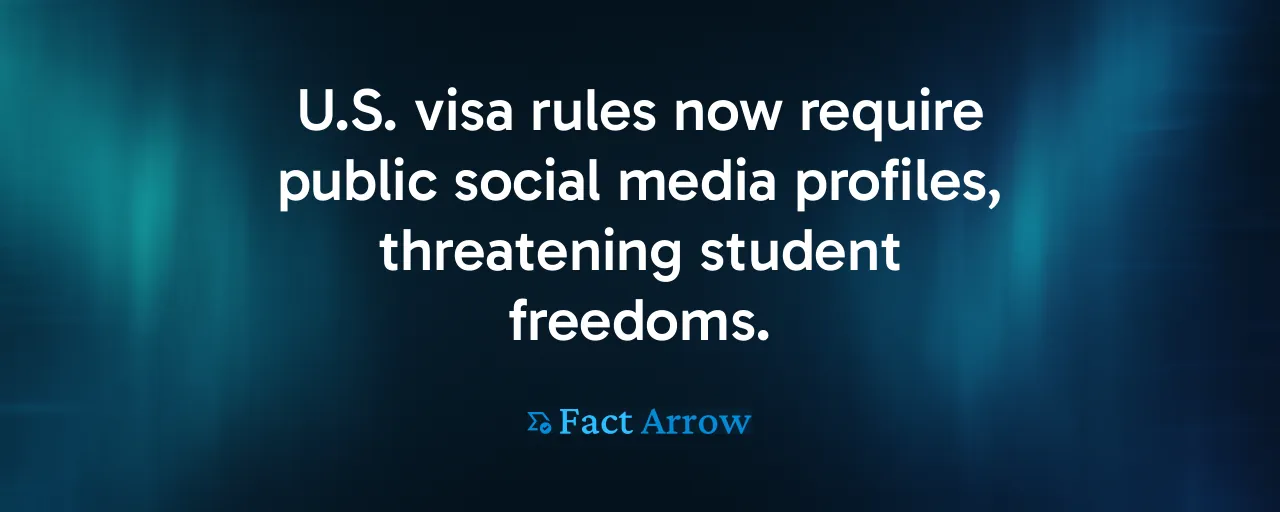A New Barrier to Global Education
On June 18, 2025, the U.S. State Department announced a bold change to its visa process for international students and exchange visitors. Applicants for F, M, and J visas are now required to set their social media profiles to public, allowing consular officers to screen their online activity. This move, framed as a national security measure, has ignited a firestorm of debate. For many, it feels like a step too far, threatening the very freedoms that make American education a global beacon.
The policy targets those seeking to study or engage in cultural exchange, groups long seen as vital to U.S. innovation and soft power. Over one million international students contribute roughly $40 billion annually to the economy, fueling research and diversity on campuses. This new rule risks deterring talent, with critics arguing it prioritizes vague security concerns over open academic exchange.
Universities, students, and civil liberties advocates are sounding alarms. They warn that forcing applicants to expose their digital lives could chill free expression, particularly for those from regions where political activism is already fraught. The stakes are high: a misjudged post could mean a denied visa, derailing dreams of studying in the U.S.
The Privacy Cost of Security
At the heart of the controversy lies a tension between safety and personal freedom. The State Department insists that reviewing online activity helps identify threats, pointing to rare cases where digital footprints revealed extremist intent. Evidence casts doubt on the effectiveness of broad social media screening. Studies, like those from the Project on Government Oversight, show high false-positive rates, where innocent posts are flagged as suspicious due to cultural or linguistic misinterpretations.
For international students, the mandate feels invasive. Many already navigate complex visa processes, with African and Middle Eastern applicants facing disproportionately high refusal rates. Forcing public profiles adds another layer of scrutiny, potentially discouraging honest expression. A Nigerian student might hesitate to post about local protests, fearing it could be misread as anti-American sentiment.
Civil liberties groups, including the American Civil Liberties Union, argue the policy overreaches. They note that vague criteria, like hostility toward U.S. institutions, invite subjective judgments. Without clear guidelines, consular officers might penalize legitimate political views, especially from Muslim or pro-Palestinian voices, raising concerns about discrimination.
A Chilling Effect on Academic Freedom
Universities are reeling from the implications. International students drive cutting-edge research, particularly in STEM fields critical to U.S. competitiveness. The new rule could deter applicants, as seen during a May 2025 visa interview pause that disrupted enrollment plans. Institutions like Harvard and Columbia have filed lawsuits, claiming the policy violates First Amendment protections by punishing free speech.
Academic freedom is also at risk. Scholars fear self-censorship, as students and researchers avoid controversial topics online to secure visas. This stifles the open debate that defines higher education. The American Association of Universities has called for narrower vetting, focused only on credible threats, to preserve the U.S. as a hub of global ideas.
The economic fallout is equally stark. Delays and denials threaten tuition revenue and research output. Other nations, like Canada and Australia, use targeted vetting without demanding public profiles, attracting students who might otherwise choose the U.S. If the policy persists, America risks losing its edge in the global talent race.
A History of Overreach
This marks another attempt to tighten visa scrutiny. In 2019, the State Department began asking for social media handles on visa forms, followed by limited vetting pilots after campus protests in 2023. A January 2025 executive order expanded screening for terrorism and antisemitism, setting the stage for the current policy. Each step has sparked pushback from educators and privacy advocates, who see a pattern of ideological overreach.
Historical data undermines claims of widespread threats. Between 2016 and 2024, the Department of Homeland Security found few terror plots linked to visa holders. Blanket policies have strained consular resources, creating backlogs that delay legitimate applications. The Government Accountability Office has repeatedly urged more efficient, evidence-based approaches, yet broad measures persist.
Charting a Better Path
Advocates for open education propose alternatives that balance security and rights. They suggest limiting reviews to posts explicitly tied to violence or terrorism, with independent oversight to ensure fairness. Applicants could submit private content securely, avoiding public exposure. Transparency about denial reasons would also build trust, allowing students to appeal unfair decisions.
Technology offers solutions. Advanced AI tools, trained to minimize bias and backed by human review, could streamline vetting without compromising privacy. Such measures align with the U.S. commitment to fairness and innovation, ensuring the visa process reflects democratic values.
The business community, reliant on global talent, supports these reforms. They argue that overly restrictive policies weaken the STEM workforce, hampering growth. Foreign governments, wary of reciprocal measures, also urge moderation, highlighting the global stakes of America's visa policies.
Reclaiming America's Promise
The visa controversy underscores a broader question: what kind of nation does the U.S. aspire to be? A fortress suspicious of outsiders, or a leader in global exchange, welcoming diverse voices? The current policy leans toward the former, risking America's reputation as a land of opportunity.
International students and scholars deserve a visa process that respects their dignity and contributions. Narrow, transparent vetting can address security without sacrificing free speech or academic freedom. By embracing these principles, the U.S. can uphold its role as a beacon of innovation and inclusion.
The fight for open education continues. Universities, advocates, and students are pushing back, determined to protect the values that make American campuses vibrant. Their efforts remind us that progress comes from welcoming ideas, not building walls.
